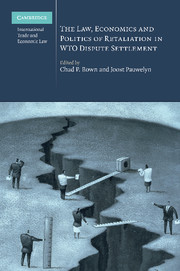Book contents
- Frontmatter
- Contents
- List of tables and figures
- Contributors
- Introduction: trade retaliation in WTO dispute settlement: a multi-disciplinary analysis
- PART I Background and goal(s) of WTO retaliation
- PART II A legal assessment after ten arbitration disputes
- PART III An economic assessment after ten arbitration disputes
- PART IV The domestic politics and procedures for implementing trade retaliation
- 8 The United States' experience and practice in suspending WTO obligations
- 9 The European Community's experience and practice in suspending WTO obligations
- 10 The politics of selecting trade retaliation in the European Community: a view from the floor
- 11 Canada's experience and practice in suspending WTO obligations
- 12 Is retaliation useful? Observations and analysis of Mexico's experience
- 13 Procedures for the design and implementation of trade retaliation in Brazil
- 14 Retaliation in the WTO: the experience of Antigua and Barbuda in US–Gambling
- PART V Problems and options for reform
- PART VI New frontiers and lessons from other fields
- Index
8 - The United States' experience and practice in suspending WTO obligations
Published online by Cambridge University Press: 26 February 2010
- Frontmatter
- Contents
- List of tables and figures
- Contributors
- Introduction: trade retaliation in WTO dispute settlement: a multi-disciplinary analysis
- PART I Background and goal(s) of WTO retaliation
- PART II A legal assessment after ten arbitration disputes
- PART III An economic assessment after ten arbitration disputes
- PART IV The domestic politics and procedures for implementing trade retaliation
- 8 The United States' experience and practice in suspending WTO obligations
- 9 The European Community's experience and practice in suspending WTO obligations
- 10 The politics of selecting trade retaliation in the European Community: a view from the floor
- 11 Canada's experience and practice in suspending WTO obligations
- 12 Is retaliation useful? Observations and analysis of Mexico's experience
- 13 Procedures for the design and implementation of trade retaliation in Brazil
- 14 Retaliation in the WTO: the experience of Antigua and Barbuda in US–Gambling
- PART V Problems and options for reform
- PART VI New frontiers and lessons from other fields
- Index
Summary
Introduction
Despite being one of the most active and successful complaining parties in the history of the WTO dispute settlement, the United States has suspended concessions in only two disputes – both against the European Communities (EC) in the Bananas and Hormones disputes. Set out below is a description of the legal and procedural framework used by the United States to suspend concessions in those two disputes. Various reasons that could explain the United States' limited resort to this implementation-forcing mechanism are also offered below.
US procedures for suspension of concessions
The United States Trade Representative (USTR) is granted the authority to suspend concessions following multilateral determinations of noncompliance with WTO rulings and recommendations under section 407 of the Trade and Development Act 2000 which amended the Trade Act 1974. As the suspension of concessions practice has developed since the mid-1990s, the first step is for the USTR to request public comment on a broad preliminary list of products. This generally occurs shortly after the expiration of the reasonable period of time if, in the USTR's view, the losing member has not fully implemented the rulings and recommendations. After analysing those comments and consulting internally within the US government, the USTR then requests public comment on a narrow final list of products. Products chosen for this smaller (final) retaliation list, pursuant to section 407 of the Trade and Development Act 2000, must include, where possible, at least some reciprocal goods of the industries affected by the failure of the foreign country or countries to implement the recommendation.
- Type
- Chapter
- Information
- Publisher: Cambridge University PressPrint publication year: 2010



